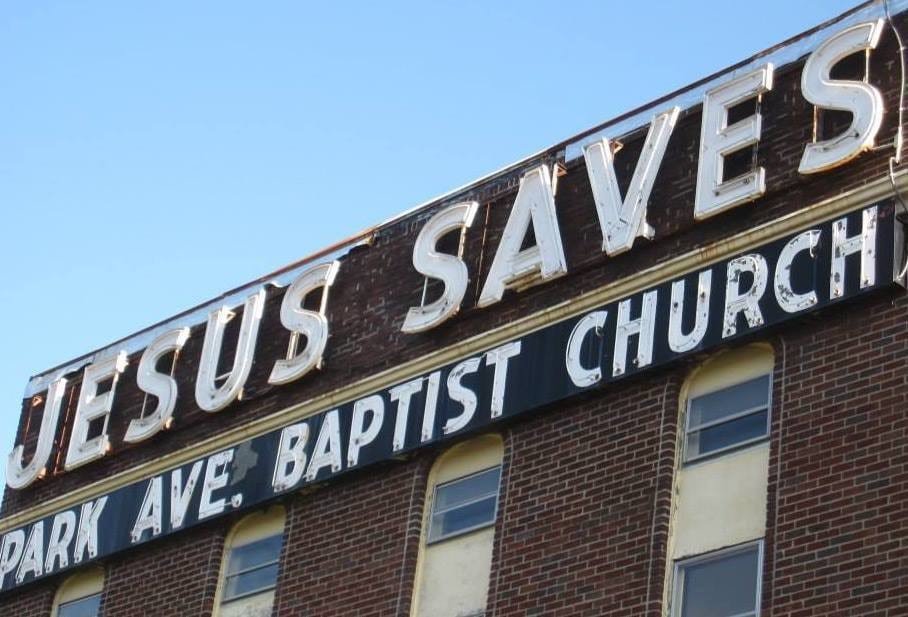OSLO – In my youth, when inviting friends to come to church with me, not all of them knew where Park Avenue Baptist Church was. But, when I simply said, “You know. The church with the sign.” Everyone knew where that was. It was impossible to come into town from the west and not see the huge, red, neon “Jesus Saves” glowing in the evening or it’s broad, white letters in the daylight. Ironically, because of the Yarovaya Law, it seems that every church in Russia needs a sign. It is illegal for a church to not have a sign with its full name. On the other hand, a sign that proclaims “Jesus Saves” is just as likely to get a church in court as not having a sign at all.
The Yarovaya Law is “a package of anti-terrorist amendments” made to sections 374-FZ and 375-FZ to toughen the criminal code that defines and limits illegal missionaries and illegal missionary activities.
Investigations by the Slavic Legal Center indicate that, rather than deterring terrorists and religious extremists, the law “harshly regulates the actions of the most innocuous of believers.” Court documents clearly indicate that evangelical churches have been the prime targets when enforcing the “anti-terrorist” law.
In 2018 alone, at least 56 organizations and 103 individuals faced prosecution under the “anti-missionary” amendment. Eighty-three percent of the cases have resulted in convictions. Ninety-eight percent of those have also resulted in fines.
“Believers don’t understand what they can and can’t do, and because of heavy fines they don’t want to take the risk and therefore significantly reduce their activity, especially in public.”
The laws are, well, confusing. Perhaps they are because legislation to deter terrorism is geared primarily to combat religious extremists like ISIS from infiltrating the country. The targeting of evangelical churches seems to be a complete misinterpretation of the law by enforcement agencies and the judiciary.
Consider this short list of examples of churches under the scrutiny of a supposed anti-terrorism law.
- Restoration Evangelical Christian Church – Not displaying a sign with its full official name on its rented building.
- Liberation in Jesus Pentecostal Church – Carried out its activities without displaying its full official name. The sign did not include the word “Pentecostal.”
- Full Blessing Evangelical Church – same charge.
- To the Ends of the Earth Evangelical Church – same charge.
- Good News Mission of Evangelization and Charity of Evangelical Christians – same charge.
- House of the Gospel – same charge.
- House of the Living God Evangelical Church – same charge.
- Jesus Embassy Pentecostal Church – same charge.
- Light of Truth Baptist Church – same charge.
- Vifaniya Baptist Union Church – same charge.
King Jesus Evangelical Church – posted videos of church events on YouTube without including the church’s full name.
And the list goes on. Each of these churches was fined 30,000 Russian rubles.
As far as the church of my youth is concerned, they would probably be fairly safe under similar legislation but the “Jesus Saves” part of the sign would make them guilty of “illegal missionary activity.”
Notable examples of “illegal missionary activity” include public baptisms and even praying in public. A married couple in Ivanovo were arrested for praying in public before partaking of their dinner in a local restaurant. In another incident, a group of evangelical Baptist pastors was fined for building a playground near a church. The allegation was that Gospel literature available inside the church might be read by children using the playground, thereby constituting “illegal missionary” activity.
This story is yet another example of how religious oppression can come from what we would consider the most unlikely of circumstances.
Russian law says that churches must have a sign with their entire name included. Beyond that, doing or saying anything that contains a Gospel message is strictly forbidden.
Let us not forget that Jesus said that the gates of hell will not prevail against His church. Let us pray for discernment for our brothers and sisters in Christ living in areas where persecution is ever present.
To read more news on Religious Freedom on Missions Box, go here.
Sources:
- Forum 18 News, RUSSIA: 159 known “anti-missionary” prosecutions in 2018
- Forum 18 News, RUSSIA: 159 “anti-missionary” prosecutions in 2018 – list
- Mission Eurasia, Mission Unacceptable: How the Yarovaya Law is Taking Effect in Russia
Image Source:
